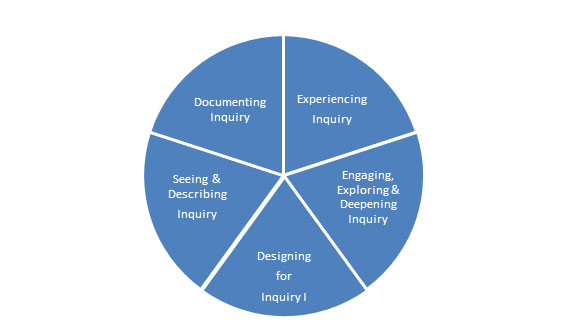
Working with Districts and Schools
Professional Development to Develop Teacher Leaders
in Inquiry-Based Learning and Teaching
Given that students who experience inquiry learning are shown to have improved attitudes toward science, improved abilities to utilize science practices and processes to identify and explain physical phenomena, and have better understanding of science concepts, we propose professional development in five (5) areas. We consider these areas a foundation for learning to engage students in inquiry learning.
- Experiencing Inquiry Learning
- Engaging, Exploring, and Deepening Inquiry
- Designing for Inquiry I
- Seeing and Describing Inquiry
- Documenting and Assessing Inquiry Learning

Figure 1: Professional Development to Engage Students in Inquiry Learning
Chart 1 below presents a synopsis of each professional development module.
Chart 1 - A Synopsis of Each Professional Development Module.
| Module | Description |
|---|---|
| Experiencing Inquiry/Exploratory Learning | Teachers experience inquiry/exploratory learning and reflect on their experience through the framework of a three-part Inquiry Learning Cycle-Exploration, Investigation, Sense-Making. |
| Engaging, Exploring and Deepening Inquiry | The emphasis here is on exploring. Teachers devise ways to engage students with selected physical phenomena and explore the different observations, questions, and ideas that students have about the phenomenon. |
| Designing for Inquiry | The emphasis here is on investigation to support inquiry. Teachers consider how they might re-work an existing activity to engage students in scientific inquiry-in which they explore a scientific phenomenon, design an investigation to gather data, and use data to generate insights into the phenomenon. |
| Seeing & Describing Inquiry | The emphasis here is on sense-making of learning. Teachers share artifacts generated by inquiry teaching. The artifacts might be student work products or classroom videotapes that show episodes of teaching and learning. Teachers look collaboratively to find evidence of inquiry; they describe what they see as evidence of inquiry. |
| Documenting & Assessing Inquiry Learning | Teachers explore ways to document, assess, and support students' inquiry learning. |
Each professional development module has a specific focus. Each module will also include some aspect of all areas. Professional development aligns with local, state, and national standards for science learning and teaching.
Below is a sample schedule that shows the focus areas for working with teachers over the course of an academic year. The schedule begins with a summer Inquiry Institute that is followed by three 2-hour sessions in the fall and three two-hour sessions in the spring. This professional development proposal concludes with an Inquiry Institute the next summer.
The schedule can be re-worked to start in either fall or spring. Additional professional development is available for teachers who complete the foundational inquiry program.
Sample Schedule
Summer (An Inquiry Learning Institute)
• Inquiry Institute I
Fall (Three 2-hour sessions between September and December)
• Engaging, Exploring, and Deepening Inquiry
• Designing for Inquiry I
Spring (A minimum of three 2-hour sessions between January and May)
• Seeing Inquiry
Summer II (An Inquiry Learning Institute)
• Inquiry Institute II: Documenting & Assessing Inquiry Learning-Science Performance Tasks
Summer Fall Spring Summer II Inquiry Institute I
- Experiencing Inquiry LearningInquiry Institute II
- Documenting & Assessing Inquiry LearningEngaging, Exploring & Deepening Inquiry Designing for Inquiry I Seeing & Describing Inquiry
- Student Work Products
- Classroom Videotapes
PROFESSIONAL DEVELOPMENT FOR TEACHERS WHO COMPLETE THE FOUNDATIONAL INQUIRY PROGRAM
Documenting Practice. Teachers find a question of interest that emerges from practice and plan and conduct an inquiry to gather data to illuminate the area of interest. Teachers make presentations of their inquiries to an audience of interested stakeholders.
Teachers Collaborate to Design Curriculum for Inquiry II. In this professional development teachers utilize the inquiry cycle to work collaboratively to design a small piece of curriculum to engage students in inquiry learning. We encourage teacher teams from within the same districts.
- Exploration & Collaborative Design: Teachers meet as collaborative partners to explore their experience in the classroom teaching science. Teachers identify a topic to engage students in inquiry learning. generate questions to guide their observations during trial teaching and assessment of the overall design.
- Curriculum Design & Data-Gathering: From this experience and reflection, they work collaboratively to design a learning experience to engage students in inquiry learning. The experience might be the re-design an existing activity. A member of the collaborating team volunteers to teach the collaboratively designed learning experience. Collaborating partners observe for the specific purpose of gathering data on the effectiveness of the design in engaging student inquiry. It is recommended that teachers visit the classroom to make first-hand observations. However, it is also possible that the team arranges to make a videorecording of the teaching that can be shared with team partners at a later time.
- Sense-Making: The collaborating team shares data and reflects on ways to use inquiry to deepen learning-looking through the lens of inquiry outcomes (attitudes, science practices and processes, conceptual understanding).
This page as a Word document.